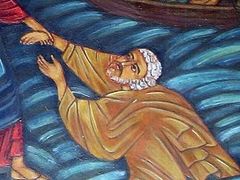While fasting with the body, brethren, let us also fast in spirit.
(Wednesday of the First Week, Vespers, Stichera)
The holy Church, having led us onto the path of the Fast as to a great labor against flesh and blood, to the extent of our efforts, only reminds us that we must go through the great endeavor in perfection. Truly, fasting in its perfection is a great labor; it embraces the virtue of abstinence in its fullest sense.
True fasting is not only abstention from food in quality and quantity, but the abstention of all our external and internal senses from touching that which is forbidden; abstention from the external and internal eye looking at things that are contrary to inner purity; the abstention of our external and internal hearing from everything that is disturbing for our spiritual peace. Perfect fasting is unceasing attention to ourselves not only in our undertakings and deeds, but also in our thoughts and dispositions; it’s the power of God ruling over us in our words, deeds, and actions, with our bodily and spiritual forces working together for the glory of God. Such is fasting in its perfection.
Because we are weak, we largely fail to fulfill many things—in fasting we fulfill some of the external actions of the Fast regarding abstinence in food and drink, but fail to fulfill the other weightier requirements—thus, the holy Church, inspiring and guiding us together in the labor of fasting, speaks to us in song: “While fasting with the body, brethren, let us also fast in spirit.”
That we might continually labor throughout the time of the Fast as a great deed of Christian temperance, with due perfection, let us learn the true property and power of fasting.
1. On external fasting
The first, initial, preparatory degree of fasting is abstinence from food, in both quality and quantity. It’s not easy to moderate ourselves and deny ourselves such a need, which is the foundation and strengthening of bodily life. Our bodily nature is wearied when it’s burdened by food and drink. But it also languishes when we deny it its necessities and force it to overcome itself, forcing it to endure the deprivation of food for a time. Such exercise of our bodily nature in overcoming itself, besides being very useful for bodily health, is also necessary for teaching it spiritual feats. The more we observe order and moderation in the consumption of food and drink, the stronger, more comfortable, and lighter our body is in movements.
But a Christian must not only keep his body in good order, enslaving and mortifying his passions, but he must also make it a dwelling of purity, a temple of the Holy Spirit; He must make it not only an instrument, but a co-worker with his spirit in prayerful standing before God, in following Christ to the cross and in achieving grace-filled dispassion through co-crucifixion with Him. How can a Christian endure the feat of crucifying his passions if he doesn’t overcome the sensory needs of his own body?! And he won’t be able to overcome his sensory needs without exercising his body in fasting and abstinence as much as possible. Exercising his body in the labors of fasting, his first work should be temperance in the quality and quantity of food and drink.
Perfect fasting requires removing sweet foods from our diet, especially those foods taken from the animal kingdom—not plants—that are meant to delight our senses. During the fasts, the holy Church forbids us to eat foods that are permitted at other times, so that by humbling our bodies by fasting, we might strengthen ourselves in abstinence from bodily sweetness.
A Christian should have no predilections for anything sensory. If, for the love of God, he must forsake love for his parents, children, and others, then all the more so for the same love of God, testing himself in overcoming his bodily predilections, he must abandon for a time all that delights his senses, and limit himself in the consumption of the simplest, most ordinary, and even the rough and bitter; that together with the royall adorned David, who during a time of spiritual lamentation ate ashes like bread, and mingled [his] drink with weeping (Ps. 101:10), we might exercise ourselves in every possible way in the feeling of both external and internal self-denial.
And although while undertaking the labor of fasting, due to the weakness of our nature, and even more so due to the difference in our way of life, activities, and deeds, it’s impossible to appoint a time and measure of eating for everyone in general, still, the holy Church, allowing the strong to be zealous in great labors, but not allowing the weak to willfully indulge in laziness, doesn’t hesitate to prescribe for all who fast a common time for taking food, which in the days of the Fast is usually the evening, and a common measure in the consumption of food that is the most necessary for the reinforcement of the body without delight and satiety, such that we’re able to fulfill the daily physical tasks of our rank without weakness. So in the days of fasting, a Christian must eat and drink in moderation, with the fear of God, to satisfy his needs without delighting his senses, that by the mortification of the carnal vitality of his body he might offer God a living, holy, pleasing sacrifice, which spiritual service to God requires, and glorify God by crucifying the passions of his body.
2. On spiritual fasting
But while fasting with the body, brethren, let us also fast in spirit. Glorifying God by abstinence in our bodies, all the more should we glorify him with abstinence in our souls. Fasting for the body is abstinence from food and drink; fasting for the soul is abstinence from the passions that war against and enslave our soul. Humbling the soul with fasting is incomparably more necessary than humbling the body. The body is an instrument, but the soul is the active cause; and although the body is the necessary co-laborer with the soul, in the actions of freedom and will, the body is only the executor of the dictates of the soul and the movements of the heart.
Meanwhile, all impure thoughts and iniquitous desires come from the heart and soul. For from within, out of the heart of men, says the Savior, proceed evil thoughts, adulteries, fornications, murders, Thefts, covetousness, wickedness, deceit, lasciviousness, an evil eye, blasphemy, pride, foolishness (Mk. 7:21-22). At the same time, it’s more difficult to humble the soul with fasting than the body. The body and bodily senses can be humbled by fasting in a short time, but the spiritual passions are stirred up in a man from youth to old age like winds and waves at sea. However, as we tame our bodily movements with fasting, we can and must tame and bring the spiritual movements of our passions into obedience to the nous.
How should we tame and subjugate our passions to the nous and our conscience? In the first movements, we must withhold our passions with attention to ourselves and sound reasoning; in prolonged actions, we must arouse in ourselves dispositions opposite to the passions that war against us; and during a strong attack of the passions, we must relentlessly struggle with them and cut ourselves off by any means possible from the tempting occurrences by which the passions are most aroused in us.
And first, perceiving in our souls the disgusting movements of anger, lust, greed, pride, and other passions, we must vigilantly stand guard and attend to ourselves and prudently calm the agitation that arises in us. Besides our love of sin, which is the common disease of our fallen nature, we are mostly carried away by our passions due to inattention and recklessness. When we remove the noetic light of reasoning in our souls, then the passions easily delight and captivate us.
Every passion is a rapid movement of the heart, immediately following the first impression of pleasantness or disgust, which seems so at the first glance, but when deliberated with a sound mind and good feeling turns out not to be so. This is why the strong movements of our hearts, uncontrolled by sound reasoning, give birth to impatience, anger, disgust, contempt, and cruelty, and from there enmity and all sorts of grievances against our neighbors.
These spiritual movements, with their first shock, greatly affect our senses. But once the first impression passes, when we dispassionately judge about the cause of our distress, and about how impatiently we sought to satisfy our vain desires, aroused in us by the attraction of our passions, we are ourselves covered with shame from our own imprudence. And so, keeping watch over our spiritual movements, we must test our words and actions with mature and calm reasoning in every case, and especially in sudden encounters, so as not to recklessly fall into a spiritual disturbance from whichever passion acts most strongly in us and is therefore most dangerous for us.
But the passions can continually overwhelm us according to our inclinations, according to our condition and knowledge. When our affairs go well, we’re attacked by flattering passions, disposing us towards self-indulgence; when they proceed unfavorably, we’re attacked by gloomy passions, inducing sorrow and despondency in the soul. Thus, we must use constant medicine against the ever-present sickness; we must nourish and constantly maintain in ourselves thoughts, feelings, and dispositions that are opposed to the passions that overwhelm us.
If our heart is overcome with dark passions, anger, enmity, hatred, then let us nourish in ourselves the quiet feelings of meekness, gentleness, and peacefulness, which are prescribed for us by the example of our Savior, that we might also try to acquire the same feelings as in Jesus Christ (Phil. 2:5). If our spirit is disturbed by lust and the carnality of youth and sensory pleasures in general, then in humbling the senses by fasting, we will curb our sensual desires with the ever-present sense of our own frailty; with the thought of death, which turns everything that flatters our senses into food for worms; with a vivid representation of how pleasing to God are temperance, purity and chastity, by which a man is likened to the bodiless angels and draws near to God.
If love of glory and covetousness darken our soul, then let us dispel the spiritual darkness with the same Divine example of meekness and humility, poverty and exhaustion of our Savior, Who, being great and rich, humbled and impoverished Himself to the form of a slave for our sake, to the point of swaddling clothes and a manger in birth, and to the point of death on the Cross. Thus we must wage warfare against our mental enemies, the spirits of malice, of the high places, who, arousing diverse passions in us, battle against that by betraying us to slavery to our passions, they might drive the sense of the fear of God from our hearts, and by removing us from this God-fearing, humble, correct, and chaste feeling, they might plunge the life of our senses into disorder. We must repel the fiery darts of the evil one with unflagging spiritual struggle.
But if the attacks of the evil spirit are strong, if the persecution with our passions is unending, then we must all the more put on all the armor of God to resist the machinations of the evil one. Keeping the mind from vain thoughts, the heart from corrupt desires, the will from spiritually harmful undertakings and intentions, we must also do everything possible to keep ourselves from every situation that is dangerous for our internal and external purity.
When we’re being hunted and fought by our enemies, then all tempting situations that can arouse the weakness that possesses us must be avoided like nets and stumbling blocks, however possible. To subject yourself to dangerous situations and actions is the same as leading yourself into temptation. If our passions and wicked habits are so overwhelming, and the situations that arouse them are so unavoidable that we’re in danger of succumbing to the struggle raging against us or of completely wallowing in the sinful addictions that overwhelm us, then, being in danger of drowning, like St. Peter let us cry out from the bottom of our heart to the One Who calms the winds and waves of our rebellious heart and will, and stretch forth our hands to Him in unceasing prayer—that with His right hand He might save us from drowning, and with His mighty words He might assuage our agitation and tempest, and establish quietness of thoughts and desires in our mind and heart, and in all the dispositions of our soul.
Thus, on the path of spiritual abstinence, we must fight against our passions; we must purify the mind from vain thoughts with unceasing, attentive self-reflection, the heart from impure desires with vigilant, dispassionate self-examination, the will from illicit desires with the fear of God and cutting ourselves off from temptations as much as possible. When we resist unto blood, striving against sin (Heb. 12:4), then we will receive the fruit of our labors.
We will call out to the Lord, and He will draw near to us; He will illuminate our darkness with His light, warm our coldness with His warmth, and strengthen our infirmities with His Divine power. According to the measure of the purification our internal and external senses are , so will grace-filled healing shine in us like the dawn. By the power of grace, our enlightened mind will disperse vain thoughts like a mist; our heart bedewed with purity will dispel sinful desires like phantoms; our strengthened will will overcome external and internal temptations and break them as snares; the sole object of our care will be not to place any stumbling blocks for others either in deed or word, so as to walk in the light of the face of God, to keep ourselves in external and internal integrity before God and man, walking in the footsteps of our Divine Ascetic;1 and, according to our strength, to labor and suffer with Him, and die to our passions with Him, that we might also resurrect with Him unto the life of grace and glory. Thus, while fasting with the body, brethren, let us also fast in spirit.
Amen.
1 Literally, the founder/beginner of asceticism—“Подвиголопожник (Pozvigopolozhnik)”—Trans.





